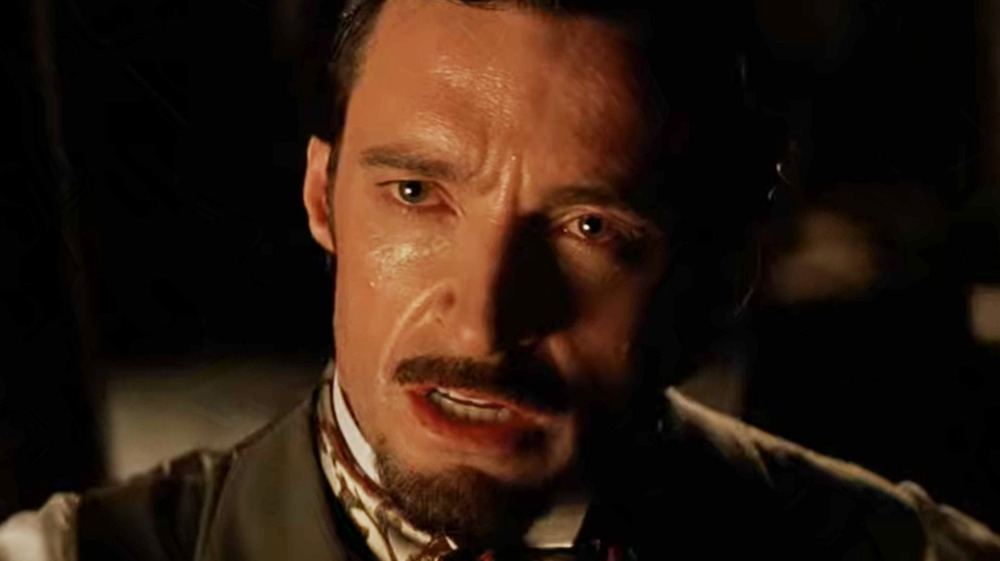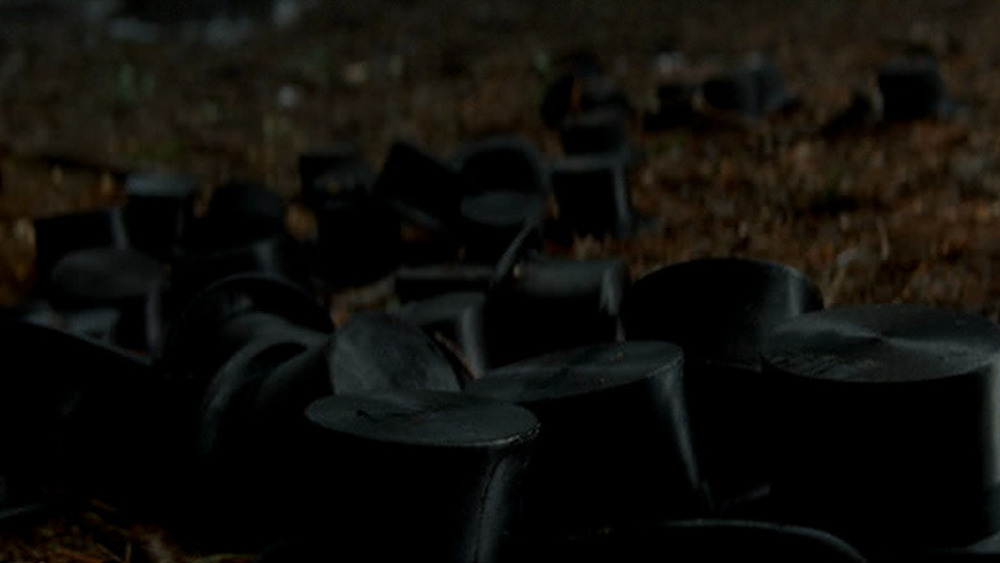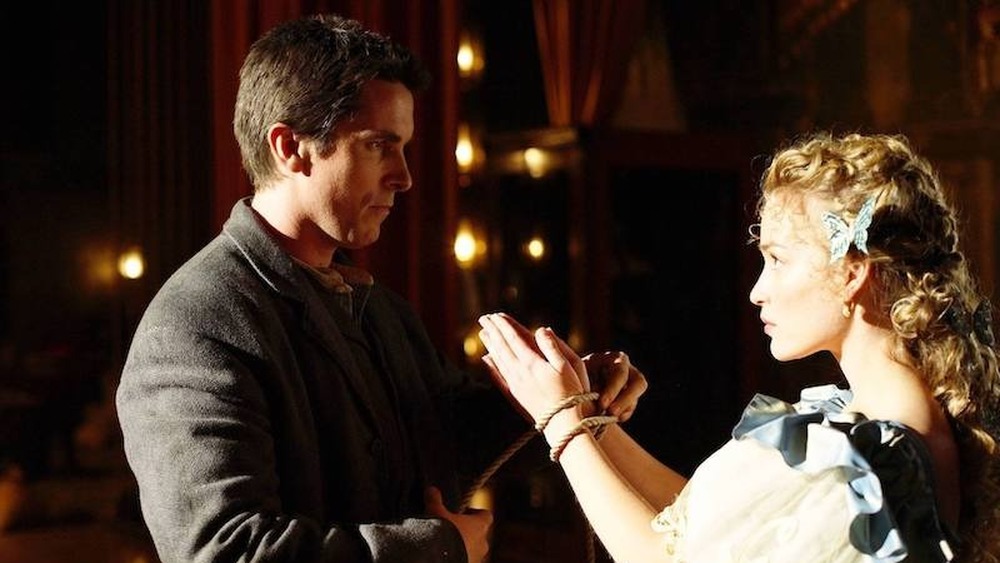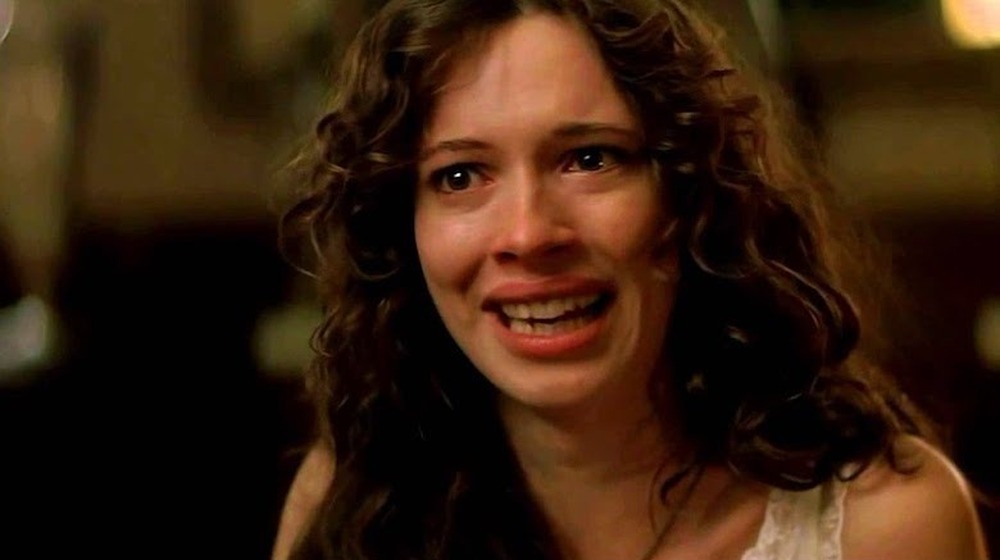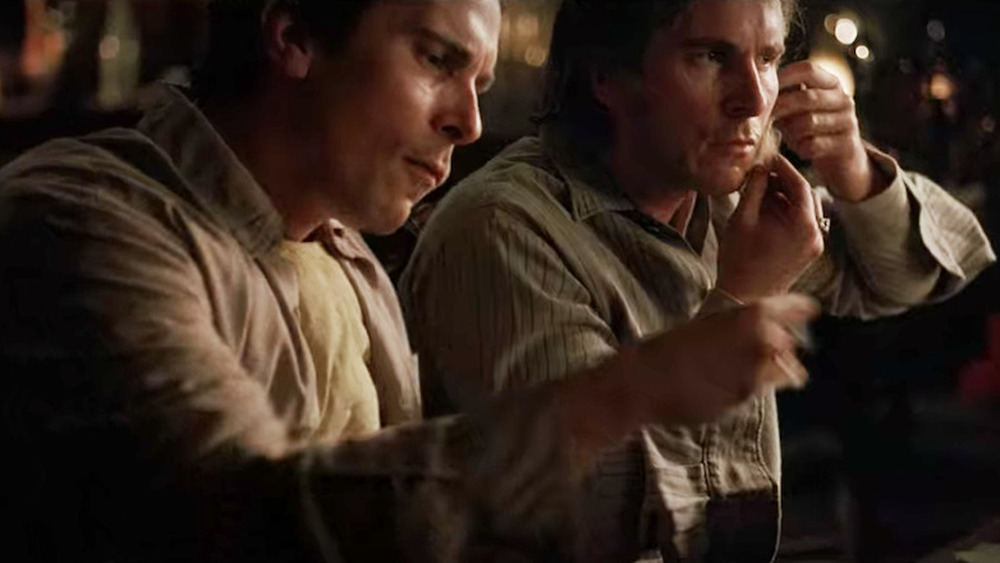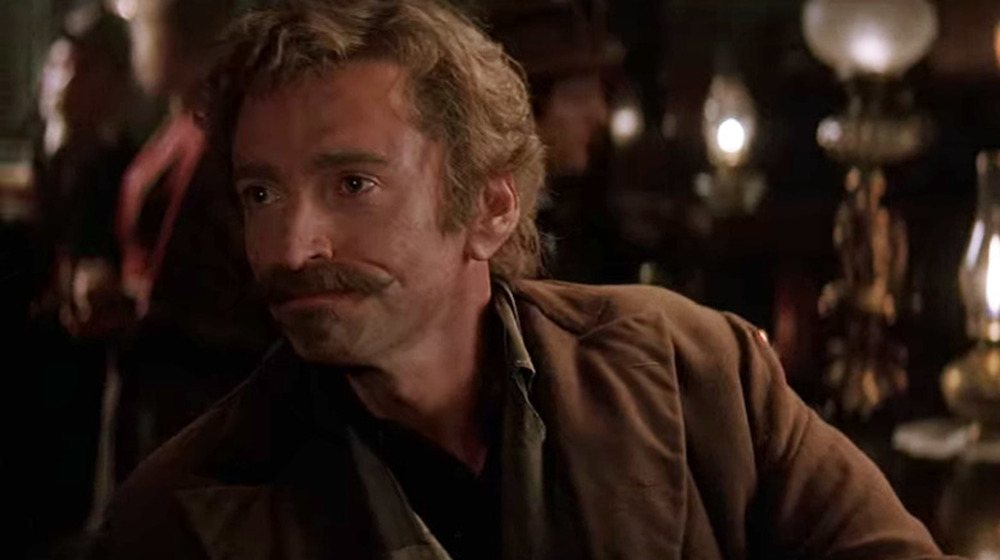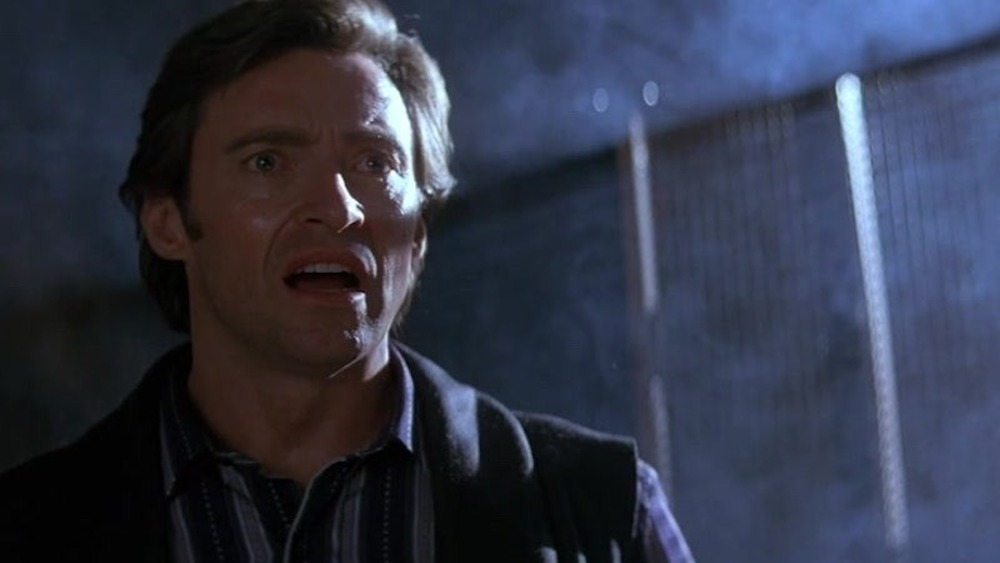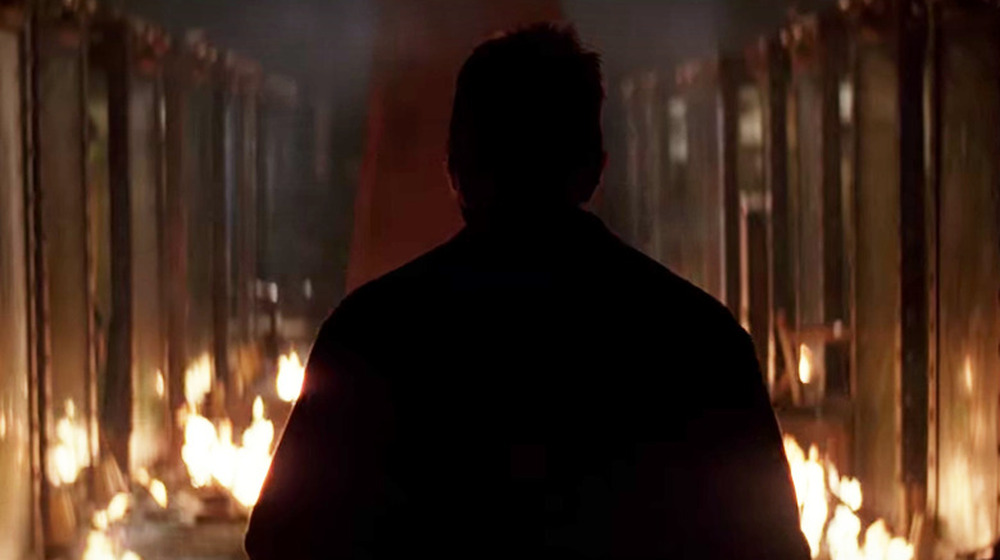Things You Only Notice About The Prestige After Watching It More Than Once
Christopher Nolan might be well-known for his love of toying with nonlinear storytelling and exploring complex themes about time and identity, but back in 2006 he was still able to hoodwink general audiences into going into his films unaware of what might lie ahead. Sure, Memento and Insomnia had some great twists involved, but many went into The Prestige not knowing what kind of twist awaited them.
Based on the book of the same name by British author Christopher Priest, the film explores the complex rivalry between two stage magicians in 18th century London. With X-Men's Hugh Jackman and Batman Begins star Christian Bale playing the two warring illusionists, it's a story about how deep their conflict runs as well as how it warps their perception of the world. Although both characters have their own romantic entanglements, the contentious dynamic between the two is the key relationship in the film. It's one that only gets even more complicated as Christopher Nolan peels back the layers of whom they really are and what they're truly capable of in their ambitious struggle.
Because of the numerous twists scattered throughout The Prestige's story, there's plenty to pick up on in repeat viewings.
The opening reveals the ending
If you've seen The Prestige before, you'll know it culminates in the shocking reveal that Alfred Borden (Bale) is an identity shared between a set of twins, with one brother acting as his assistant "Fallon" when the other was living as Borden. To make things even more complicated, Robert Angier (Jackman) ends up creating a countless number of clones in his new version of the Transported Man trick.
The opening shots of the film actually tease both reveals for Angier and Borden in a stylish visual showing all the duplicated top hats that the assistant of David Bowie's Nikola Tesla uses in the machine later on. The hats signify Angier, who gets duplicated each time he uses Tesla's machine to transport himself across the crowd during his performances. Much like the hats left in the wilderness, the Angier clones are discarded in tanks of water hidden underneath the stage.
The film then jumps to a shot of two canaries sitting in separate cages, a clear reference to the Borden twins living as one entity. Nolan is a meticulous filmmaker, and putting these two shots next to each other is definitely a nod to what the finale comes down to, clones and twins.
Angier could've checked the knot that killed his wife
The central conflict between Angier and Borden stems from the tragic death of Angier's first wife Julia (Piper Perabo) during a water tank escape trick for another magician. Tragedy was already foreshadowed with Borden discussing using another knot to tie her hands, but there was a concern about the rope swelling too much. It's never revealed which knot Borden decides to use, and it's that uncertainty which causes Angier to harbor such resentment for his rival — solely blaming him for Julia's death.
But he could've got some closure very quickly by checking the rope on her hands in the immediate aftermath of the accident. Obviously, he was consumed by grief and was trying to save her life, but nobody thought to check which knot the rope had been tied in. Even Michael Caine's stage engineer doesn't take a quick look, which is surprising since he's the one who raised the concern about a new knot in the first place.
Sarah Borden ruins a twist early on
Poor Sarah Borden. Rebecca Hall's character in The Prestige is forced to deal with the emotional whiplash of unknowingly being in a relationship with two men. Obviously, one Borden brother loves her, while the other loves his assistant Olivia Wenscombe (Scarlett Johansson). Early on in the film, she notes that Borden seems to truly love her, while on other days he's faking it — if only she'd looked a little closer at the one who troubled her, she might've been saved from her own horrific realization.
During a desperate confrontation with one of the Borden brothers, Sarah cries out that she knows "what you are." It's her wording that makes that line of dialogue fascinating, because clearly Sarah has discovered the truth from the twins and has broken down over the revelation that her entire life is a lie. If Sarah had told Borden she knows "who you are," then it could've been read as her calling out the commitment issues that he seemingly had day-to-day. But by saying "what," it throws just enough ambiguity to make the audience question just what she's getting at.
Unfortunately, like many wives in Nolan's filmography, Sarah Borden winds up dead. Hello, Memento, Interstellar, Inception....
Did the Borden brothers decide to be magicians as children?
Since the Borden brothers both switch between playing Alfred and his assistant Fallon, it's not clear if that was their names growing up or if Fallon is an entirely new identity they created for this very purpose. Early on in the film, Nolan teases the idea of total devotion to the performance when Angier and Borden watch a Chinese magician who pretends to be disabled to fool his audience with great feats of strength. The obvious suggestion is that Borden and Angier have to give their all to get one up on each other — but like most of Nolan's films, it goes deeper than that.
When the Borden reveal happens later on, it's clear they've perfected their routine of switching between Alfred and Fallon. But it doesn't reveal when they decided to embark on this career. Does that mean the Borden twins had planned to be magicians since they were children, planning to fool the world as a singular person? That's one hell of a hobby. We just played Pokemon as children.
Robert Angier's double is too coincidental
In a bid to keep up with Borden's Transported Man trick, Robert Angier employs a double that looks just like him to make it appear that he's jumped across the stage in front of the audience's eyes. Unfortunately the double, called Gerald Root, just winds up asking for more money after he's tipped off that he could be charging a lot more since he's the very hook of the act. It wouldn't work without him. But his entire existence feels too coincidental.
Scarlett Johansson's Olivia explains to Angier that she found the alcoholic in a bar, and because Root is a former actor, he's already used to performing on stage. But what are the chances of the assistant wandering into a bar and finding Root at the exact time that Angier needs to find a doppelganger? We're not saying Root was part of Borden's plot to ruin Angier, nor is he a clone, but it's just too much of a coincidence in the movie for the audience to take it seriously.
Angier could've used one clone to do the original Transported Man trick
By the end of The Prestige, we see Angier has become consumed by the fame and money that his new version of the Transported Man illusion gives him. He's become dedicated to hiding the secrets of all the drowned clones, even hiring a blind crew to work with him, so they don't know what it is they're helping with. But considering he's meant to be a relatively smart individual, it's surprising he never once thinks of making one clone to work with him on doing the original version of the trick.
Since it would literally be a second version of himself, he wouldn't have the same issues that he had with the alcoholic double, Mr. Root. They'd both be able to share in the glory, swapping roles with each show because it would be the same Angier. Obviously, the device built by Nikola Tesla adds to the spectacle of the performance, so it's understandable why he wants to keep it. But the moral weight of not knowing if he was going to be the man in the box or the one facing the applause would surely cripple Angier's mental state before too long.
Everyone loses
The Prestige's ending is a truly bittersweet one. While one Borden is hanged for supposedly killing Robert Angier, the mysterious Lord Caldlow (whose name is mentioned throughout the film) is revealed to be Angier's real identity. Much like the Borden twins' dedication to living one life, Caldlow has been living as Angier for decades in his attempt to become a world renowned magician.
In a final confrontation between Caldlow/Angier and the surviving Borden, the pair lament about how their rivalry has absorbed their lives in a whirlpool of hatred and grief. Although Angier won the hearts and minds of his audience, he dies after being shot by Borden. In his final moments, it's clear that he regrets everything, but it's a little too late as he passes away surrounded by the corpses of all the clones he murdered.
It'd be easy to read the surviving Borden as the "winner" of the film, since he gets to live life looking after his brother's daughter, Jess. But his dedication to the magical cause has ripped his brother away from him as well as his love of being a stage magician. It's all very bittersweet.
Anyway, who wants to see a magic trick?
